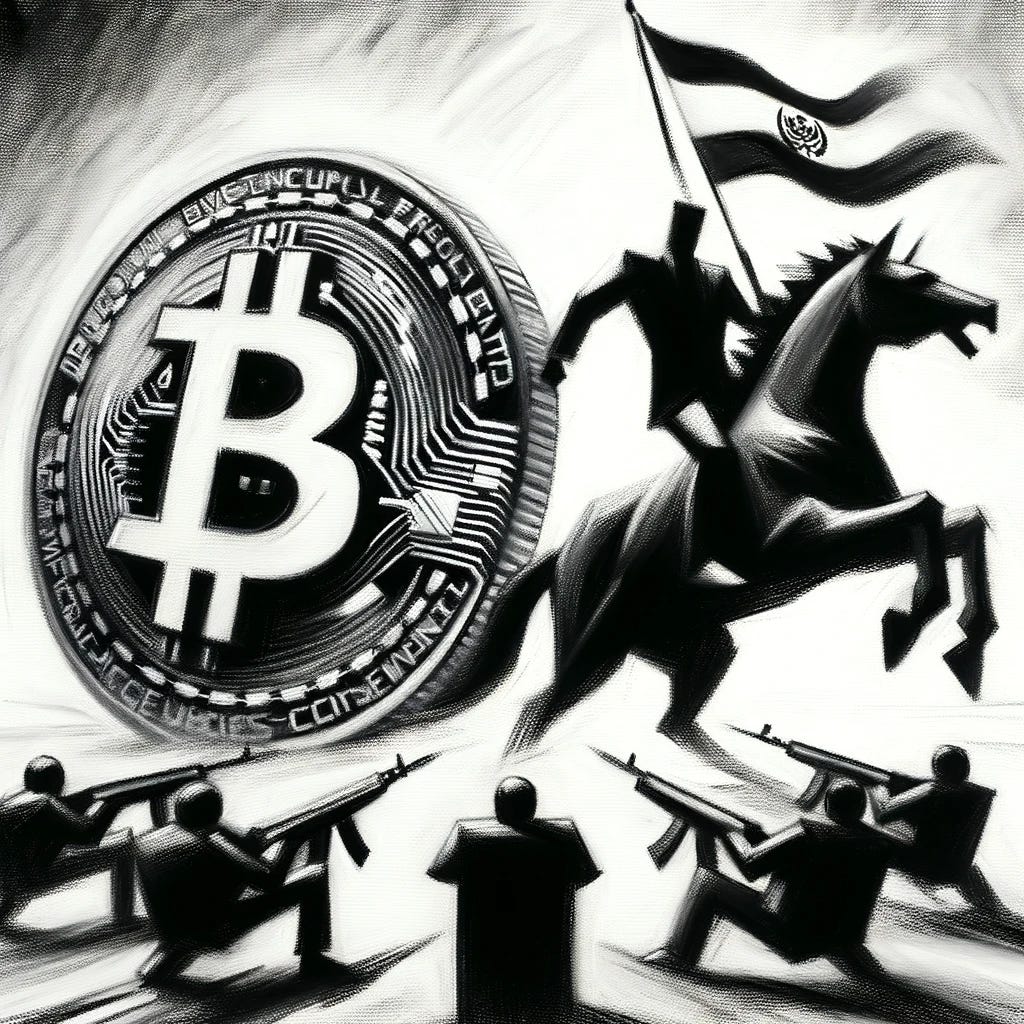LexNews+ Weekly No. 11
Gary's geofencing gamble; Franklin Templeton files for spot ETH ETF; CitiBank x Avalanche; Semper DeFi - opposition to new AML proposals; Disproving the crypto --> terrorism pipeline, and more.
Sections:
1. Headlines (The top stories in cryptolaw this week)
2. Podcasts
3. LexDAO weekly
4. Closing Statements
Headlines
1. Gary Gensler’s Geofencing Gamble
Haroldo
This week, yet another promising crypto project “geofenced” (or geographically excluded) U.S. markets from accessing it. Liquid staking and restaking protocol Etherfi blocked users in the U.S. and included the following on their FAQ forum:
“If you are located within the United States of Canada, our proactive geofencing will prevent you from engaging with our protocol.”
Geofencing involves using GPS coordinates around an area to limit the availability of services to that area. It is used enthusiastically by most streaming services, and over the past few years, by many non-U.S. crypto projects.
At the heart of the discussion is the SEC’s non-official policy of regulation by enforcement, as opposed to actually regulating crypto. A lack of clear regulation has led many non-U.S. projects to simply prefer avoiding the U.S. altogether in an attempt to avoid regulatory uncertainty.
Whether limiting Americans' access to these projects protects them from bad actors or not, many popular memes lament Gary Gensler protecting them from earning money from airdrops. Given widespread usage of VPNs to circumvent geofencing, it seems that the process does not accomplish either the crypto projects or the SEC assumed objectives.
(see also: Jake Chervinsky on X)
2. Franklin Templeton files for spot ETF: will it succeed?
Kyler
Franklin Templeton is joining the digital asset race, filing for a spot ether ETF and stepping into the competitive arena alongside giants such as Ark and BlackRock. This move signals the firm's commitment to providing investors with a more conventional means of engaging with ethereum, a more “boomer friendly” alternative to the complexities of direct trading or navigating digital asset exchanges.
Unique to Franklin Templeton's proposal is its consideration of staking the ether held by the fund, a strategy aimed at generating additional returns through staking rewards. This approach distinguishes it from some of its competitors, including BlackRock, which has not included similar language in its filings. Ark 21Shares has also touched upon staking in its updated prospectus, albeit with notable caution, indicating a tentative exploration of this territory.
Spencer Hughes, an analyst at Blockworks Research, highlighted the significance of this development, suggesting it represents a crucial intersection between traditional finance and digital assets. With approximately 25% of the total ETH supply currently staked, the inclusion of staking in an ETF's strategy could pave the way for a new paradigm in how traditional investment vehicles interact with the crypto economy.
3. Citibank Ventures into Tokenized Securities on Avalanche Blockchain
Jordan
One of the world’s largest financial institutions, Citibank, is delving deeper into the world of blockchain technology, experimenting with tokenized securities on the Avalanche blockchain. It is an interesting step of the traditional finance, Wall Street conglomerate, into the ever-growing world of DeFi.
Collaborating with investment management firm Wellington Management and cryptocurrency-friendly ETF sponsor WisdomTree, Citibank initiated a "proof of concept" program. The simulated test involved incorporating fund distribution rules directly into the underlying smart contract of Wellington's fund, dictating how tokens would be allocated among WisdomTree's clients. Puneet Singhvi, Citi's institutional head of digital assets, emphasized the importance of the simulation in demonstrating the feasibility of issuing and safeguarding tokenized assets on behalf of clients within a controlled environment while ensuring compatibility within existing banking systems.
It is claimed that this process outlines a regulatory-compliant pathway for institutions to embrace blockchain technology
Citi also assessed several transfer scenarios utilizing smart contracts that depended on WisdomTree’s simulated identification credentials. It also used a private fund token as collateral in an automated loan contract with DTCC Digital Assets (formerly Securrency) as part of the trial.
Citibank seems to be on the vanguard, and its exploration into blockchain-based securities builds upon its previous milestones, including becoming the first digital custodian of the BondbloX Bond Exchange. The institution's former executives have also announced plans to issue Bitcoin Depository Receipts (BTC DRs) to global institutional investors, offering Bitcoin exposure without requiring registration under the Securities Act of 1933.
Blockchain use by financial giants increases with the growth of blockchain technology, and financial institutions have heavily backed the latest developments in digital ledger innovation. Banks usually use blockchain technology in their formal system to have easily accessible records. According to DBS Bank, the capacity of blockchain technology to offer a transparent and safe method of transaction recording is one of the main advantages for the banking industry. Transactions in conventional banking systems are usually kept in a centralized database. Blockchain technology, on the other hand, records transactions in a partially decentralized network. What is the result? Lower chance of fraud, less cyberattacks, and more robust structures so that the system cannot be undermined from any one single point of failure.
4. Semper DeFi - 80 former military, NatSec personnel rendezvous with Blockchain Association in opposition to proposed AML legislation
Miner
The day before Valentine's Day, the Blockchain Association–a nonprofit trade group representing business interests in Web3–sent a letter to Congress cosigned by 80 former military and national security personnel expressing their collective concern over proposed AML legislation sponsored by Massachusetts Senator Elizabeth Warren; the Digital Asset Anti-Money Laundering Act of 2023 (DAAMLA).
An accompanying press release by the Blockchain Association also expressed concern with the Crypto-Asset National Security Enhancement and Enforcement (CANSEE) Act, introduced by Senator Jack Reed of Rhode Island with the support of a bipartisan group of senators.
Signers of the letter assert such legislation, if enacted, would cripple domestic blockchain innovation and undermine national security while failing to accomplish their stated goals of stopping illicit financial activity via blockchain technology.
Specifically, they contend:
U.S. competitiveness and technological leadership are essential to our nation’s security.
Digital assets and the underlying technology are pivotal to our nation’s strategic advantage.
The Digital Asset Anti-Money Laundering Act (DAAMLA) risks our nation’s strategic advantage, threatens tens of thousands of U.S. jobs, and bears little effect on the illicit actors it targets.
The legislation in question seeks to expand Know-Your-Customer (KYC) and anti-money laundering (AML) requirements to a host of digital asset participants such as miners and validators. It would also direct the Treasury, Securities and Exchange Commission, and Commodity Futures Trading Commission to craft a new AML review process enforcing Bank Secrecy Act compliance on digital asset entities.
Authors of the letter, however, argue these proposals are incongruent with blockchain technology and will instead drive Web3 innovation and talent overseas causing the technology to be further developed outside the US, in effect causing less security and providing greater opportunity to circumvent existing domestic laws and regulations.
Though expressly signed independent of their employers, singers of the letter work at numerous instantly recognizable organizations seminal to Web3, including Coinbase, Andreessen Horowitz, and Horizen Labs, Inc.
Per the Blockchain Association’s press release, the coalition of cosigners plans to convene on Capitol Hill for an advocacy day on March 14.
5. U.S. Treasury Debunks Narrative That Hamas Relied on Crypto to Fund Terrorism
Kyler
In a recent testimony before Congress, U.S. Treasury Undersecretary for Terrorism and Financial Intelligence Brian Nelson addressed misconceptions about the role of cryptocurrency in funding terrorism, specifically concerning the militant group Hamas. Contrary to previous reports suggesting that Hamas had garnered tens of millions in crypto to support their operations, Nelson clarified that the reality was far less dramatic. His statement rebuts the notion that digital assets have become a significant tool for terrorist financing, highlighting that traditional means of funding remain the preference for such groups.
The issue came to the forefront after attacks attributed to Hamas in Israel last year, with initial media reports and analysis blaming cryptocurrencies for facilitating these activities. This was based on an analysis by the blockchain analytics firm Elliptic, which was later revised. Despite corrections from analytical firms Elliptic and Chainalysis, the narrative persisted in some circles, influencing legislative discussions aimed at imposing stricter regulations on the crypto industry in the name of thwarting terrorism.
During a hearing with the House Financial Services Committee, Nelson underscored, "We don't expect the number is very high," when discussing the actual volume of crypto-assets that have ended up in the hands of terrorists. This comment was in response to a question from Rep. Tom Emmer (R-Minn.), who sought to clarify the extent to which Hamas utilized cryptocurrencies. Nelson's testimony suggests a significant gap between public perception and the reality of how terrorist groups like Hamas fund their activities.
The Treasury has not only targeted crypto transactions but also imposed sanctions on businesses and regional financial firms accused of aiding terrorist groups through traditional financial methods. Nelson emphasized the need for additional tools and resources to effectively combat the misuse of digital assets for illicit finance, signaling an ongoing concern for the government despite acknowledging the limited use of such technologies by terrorist entities.
Podcasts
Too tired to read, anon? We feel that. Try these instead:
LexDAO weekly:
Governance Updates
Updates and agendas for all things LexDAO can be found in the Governance Agenda Document
2024 Membership Drive
We’re going to be live on the scene and on the airwaves at ETH Denver with in-person meet-ups, afterparties, live streams, study groups, gaming tournaments, and podcast features all slated throughout the coming weeks. This membership drive will serve to rally the troops for 2024, which is set to be our most successful and exciting year yet.
Membership Discounts & Work-for-Membership Opportunities
Partnership and Sponsorship Opportunities
Raffles and Contests!
Win free advertising placements in our publications!
LexDAO branded swag coming soon. Stay alert.
Get involved by reaching out to Kyler or Fortunado in the LexDAO discord!
Closing Statements
We want to hear from you:
If you enjoyed what you read today, subscribe to receive the weekly publication and give the authors a follow on Twitter for live updates throughout the week. Additionally, consider becoming a member of LexDAO! There’s no better time than now, join our discord and ask about discount and Work-for-Membership opportunities before they run out!










